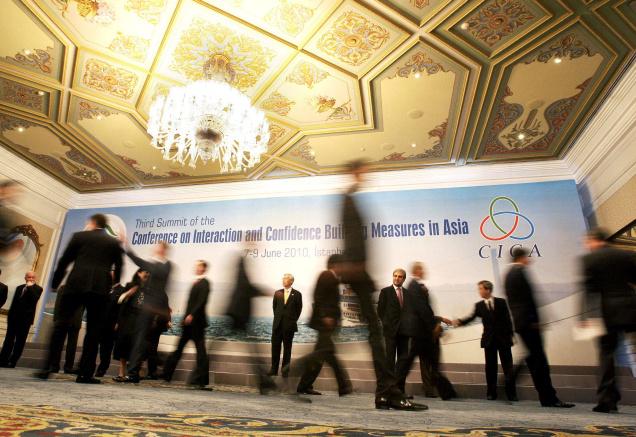
Kazakhstani-Turkish Security Cooperation Deepens Within the CICA Framework
Publication: Eurasia Daily Monitor Volume: 9 Issue: 196
By:

When President Nursultan Nazarbayev visited Turkey earlier this month (see EDM, October 19), one of the issues he discussed with Turkish officials was the two countries’ joint leadership of the Conference on Interaction and Confidence Building Measures in Asia (CICA). Nazarbayev initiated the creation of this multi-national forum for enhancing cooperation toward promoting peace, security and stability in Asia in October 1992, at the UN General Assembly. Kazakhstan then chaired and developed the CICA until 2010, when Turkey assumed the chairmanship, recently extended until 2014.
The institution-building phase culminated in the first CICA Summit of the Heads of States and Heads of Governments on June 4, 2002 in Almaty, where the 16 member country leaders signed the “Almaty Act” (effectively the CICA Charter) and “The CICA Declaration about the Elimination of Terrorism and Promotion of Dialogue between Civilizations.” Today, the CICA is made up of 24 member countries that include approximately 90 percent of Asian territory, almost half the world’s population, and a growing share of the world’s gross economic output (https://www.s-cica.org/page.php?page_id=7&lang=1).
To give consistency and depth to their CICA commitments, the member governments in October 2004 adopted a “CICA Catalogue of Confidence Building Measures.” The confidence building measures (CBMs), all voluntary, emphasize the exchange of information regarding political-military, socioeconomic, environmental, and other issues that could cause conflicts among countries or, conversely, promote cooperation among them. The adoption of new CBMs, like all CICA decisions, requires unanimous consent. The unanimity principle gives any member the right to veto CICA decisions. But all member states enjoy the inalienable right to communicate their views on relevant issues (https://www.s-cica.org/page.php?page_id=7&lang=1).
The process of institutionalizing the CICA has continued since then. The 2010 leadership transition from Kazakhstan to Turkey confirmed the Conference’s institutional strength following its two-decade “incubation period” in Kazakhstan. At the 2010 Istanbul summit, President Nazarbayev noted “that Turkey possesses unique historic, political and cultural experience to advance this extremely complex process of building confidence and promoting Asian cooperation” and that “the Republic of Turkey will add great momentum to the strengthening and further development of our Conference” (akorda.kz, June 8, 2010). The current Kazakhstani-Turkish partnership within the CICA is seen in how the Secretariat remains in Kazakhstan while being led by Executive Director Çınar Aldemir, a Turkish diplomat.
Kazakhstan used its 2010 chairmanship of the Organization for Security and Cooperation in Europe (OSCE), the first time an Asian country had ever held that position, to strengthen its links with the CICA. For example, they arranged the meeting of the first ministerial-level conference between the two organizations. At the June 2010 CICA summit in Istanbul, President Nazarbayev called for the establishment of an OSCE-CICA Forum to ensure ongoing dialogue between the two organizations (Erlan Idrissov, World Politics Review, July 14, 2010). The CICA and the OSCE both operate similarly on the basis of consensus and voluntary actions by members. Both organizations share the same goal of achieving peace and stability throughout their respective regions. They also share some member countries, Kazakhstan being a prominent example.
The CICA held its fourth foreign ministers summit in September 2012 in Astana, which also celebrated the organization’s 20th anniversary. In his speech at the summit, Nazarbayev called for creating a comprehensive platform for Euro-Atlantic and Eurasian security cooperation that would encourage interaction among all the regions’ security institutions: the SCO, CSTO, NATO, OSCE, UN, CIS, EU and the CICA. The new proposal aims to reduce duplication among the activities and functions of these institutions as well as promote synergies among them (Kommersant, September 18).
Kazakhstani officials realized the importance of this objective during their 2010 OSCE chairmanship, and then developed and refined a draft proposal, which they completed in August 2012 (Tengrinews.kz. September 18). A source close to the presidential administration told the press that, “In spite of the variety of platforms, organizations and unions in the Euro-Atlantic space and the Eurasian space, the potential of cooperation in resolution of security issues is scarcely used.” The source said that Kazakhstan wanted to “fill this gap” without “creating another ponderous structure with a secretariat and disputes over a hierarchy of priorities.” Astana wanted the new structure “to be flexible and result-oriented.” The initial objective is simply to have members of the various regional organizations interact on the sidelines of existing forums, such as the UN General Assembly. Later there might be special summits devoted to this goal or even a “full-scale organization” (Tengrinews.kz. September 18). Russian officials have termed the proposal well-meaning but “unrealistic” (Kommersant, September 18).
In coming years, Kazakhstani and Turkish officials would like to promote the development of new CICA CBMs, including in the cultural domain. They also want to deepen support for Afghanistan through the CICA (author interviews, June 2012).
A major priority, and a source of concern, is to galvanize official US interest and support for the CICA process. During their presidential debate earlier this week, both President Barack Obama and Governor Mitt Romney described Asia as an increasingly important region for the United States. Yet, Kazakhstani and Turkish officials note that their US counterparts often decline to participate in CICA activities and seem uninterested in exploiting the institution’s potential. Kazakhstani and Turkish authorities consider US indifference a wasted opportunity to generate additional support for achieving US objectives in Afghanistan, Central Asia and the Asian region more broadly (author interviews, June 2012).




